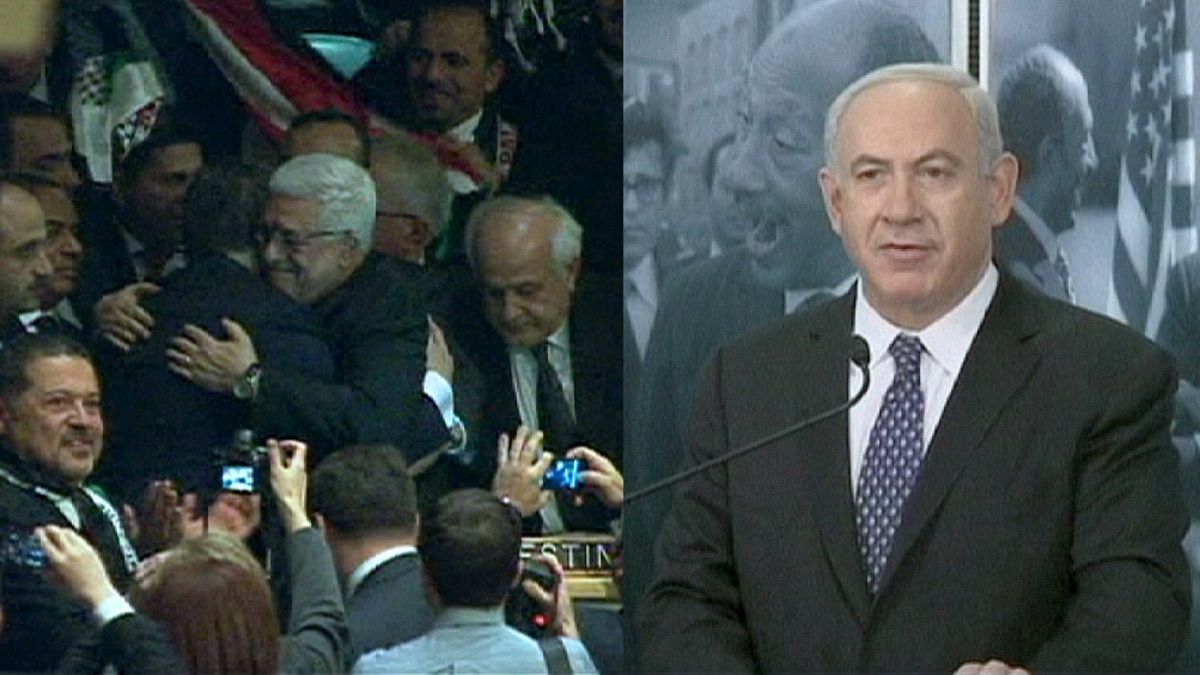A more than 70 percent majority of the United Nations General assembly members voted in favour of non-member observer status for the Palestinian people as a state, rather than an ‘entity’: 138 voted yes (14 of these were EU), 41 abstained and only nine voted no. These were Israel, the US, Canada, the Czech Republic, Panama and a cluster of Pacific island nations.
The US condemned the vote, calling it counterproductive. Israel’s UN ambassador took it calmly. Others said it confirmed global impatience for a two-state solution for the Palestinians and Israelis to be sought more effectively.
The Israeli government had expected the result, while it tried hard to dissuade the Europeans from supporting the Palestinians, or at least convince them to abstain. But in the end, Prime Minister Benjamin Netanyahu said it would not help the people living in the Palestinian territories or abroad.
Netanyahu said: “The decision at the United Nations will change nothing on the ground. It will not advance the establishment of a Palestinian state; it will delay it further.”
No Israeli government wants to act against its own citizens in the Palestinians’ favour, even though UN General Assembly Resolution 66/17 – 2012 reaffirmed the illegality of Israeli settlements in occupied territory which the Palestinians claim for a state, including East Jerusalem.
On the legal front, there is also the question of whether the Palestinians will seek to exploit new rights of access to the International Criminal Court. Dore Gold, a former Netanyahu advisor, took that seriously.
Gold said: “The Palestinians have clearly improved their position for taking certain measures in the future. For example, they can turn to the prosecutor of the International Criminal Court in the Hague and begin making all kinds of charges against Israeli officers, never mind that they are baseless as they have been in the past. But if they use this new status in a hostile way against the State of Israel, then Israel must take very severe steps against the Palestinian Authority.”
Israel has shown its anger at the UN vote by threatening to withhold some 200 million euros out of monthly transfers of duties it collects on the Palestinian Authority’s behalf, and to give fewer permits for Palestinians to work in Israel. There is also the prospect of confirming the construction of thousands more settler housing units.
Israel’s ambassador to the European Union, David Walzer, when our correspondent James Franey spoke to him in Brussels following the UN vote, refused to be drawn about how his country plans to act towards the Palestinians in the face of their determination for status.
James Franey, euronews:
“The Palestinians say they have been waiting since 1947 to have some kind of recognition of statehood. What is Israel scared of in opposing this move?”
Walzer:
“Israel fears nothing in this respect. We are sometimes fearful but this is not frightening us. We are looking at this UN bid as an exercise which will lead us nowhere. Pragmatically looking at it, it will not help the Palestinians to realise their dreams of an independent Palestinian state, and will not promote them one inch forward. What it will do is it will broaden and deepen animosity, and make it much more difficult for the two sides to get back to the negotiating table and discuss and decide about the parameters needed in order to establish that Palestinian state, which will live side-by-side in peace and security with Israel.”
euronews:
“I spoke to a senior PLO diplomat yesterday, and he said, “It’s impossible to negotiate your slice of the pie when Israel is eating it whole.” Those were his words. How would you respond to that? That is their key position.”
Walzer:
“I would respond to that by asking my Palestinian colleague, or your Palestinian colleague, the one you interviewed: why do they pick on this issue only? I’ve mentioned here a few issues which Israel is very much interested in discussing: security, final borders, recognition of Israel as the Jewish state, and other issues which are of that nature. All those are final status issues. I’m saying it very clearly: the question of settlement is reversible. The other issues are much more difficult to reverse. So, this is why the Palestinians – and they know it very well – are avoiding discussing those core issues. And pick on the settlements. Let me remind you of something else, with your permission. This government of Israel was the first government since 1967 which declared a freeze on settlement-building. This was Netanyahu’s government.”
euronews:
“You talk about consequences for the Palestinians. Can you elaborate on what you mean by that?”
Walzer:
“No I could not elaborate. I don’t think it is smart to do. I said earlier that, as far as we are concerned, this Palestinian move is clearly a unilateral move, and it is a violation of agreements, and it will not be overlooked. I don’t want to elaborate.”
euronews:
“Do you rule out cutting funding to the PA?”
Walzer:
“I don’t rule out anything. I am saying that I am not in a position here to elaborate.”
